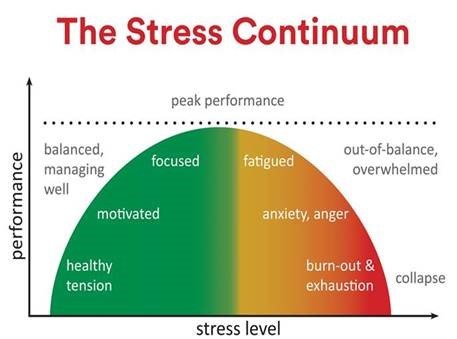
As human beings, it is inevitable that we will all experience stress from time to time. As a Neuroscience and Mental Health student, I have learned a lot about the neuroscience behind stress. But just as importantly, as a first-year student, I have learned some techniques for managing stress while taking on the new challenge and busy lifestyle of being in university.
The human stress response is how we naturally deal with any stimuli or stressors that challenge us. A stressor can be something as threatening as getting chased by a lion, or just the thought of having to write a chemistry midterm (I’ve been there!). Basically, during the stress response, our brains release hormones and neurotransmitters to control the nervous system and other areas of the body, helping us to conserve energy to deal with the challenge at hand. For example, our heart rates increase, and our digestion stops – which explains the infamous butterflies we often get in our stomachs when we are stressed. Normally, the prefrontal cortex in the human brain is responsible for complex thinking and decision making, but high levels of stress can weaken its influence. This causes other areas of our brains, such as the amygdala or basal ganglia, to gain more control, leading to increased anxiety and impulsive decisions.
As seen in the graphic below, although some stress can help us, having too much stress is never a good thing. It is important to work towards managing stress to achieve a good balance.

Source: Cornell University. (n.d.). Mental Health at Cornell: Stress management Strategies. Retrieved from: https://mentalhealth.cornell.edu/self-care/stress-management-strategies
Beginning a university career is very exciting, but it is also a big change. I grew up in a small rural town with a population of around 3 000 people. Upon starting at Carleton, I, like other first-year students, was in a completely new environment. I was greatly looking forward to the new adventure that was starting, but I was also stressed – and that is completely normal! With a few techniques, I learned to manage this stress and balance a new lifestyle at Carleton.
Here are 4 things I’ve found helpful for managing stress as a first-year university student:
- Staying organized
I have found planning and writing everything down to be very useful in managing my time and stress during very busy weeks. It has helped me to write down all semester course deadlines and test dates on calendars to refer to. I also like to write out daily to-do lists to keep track of classes to attend, assignments to work on and any activities or meetings I may have planned for each day. Staying organized helps me go through days smoothly.
- Staying active
I consider exercise to be one of my greatest outlets for stress. I always try my best to spend some time outside every day to let off steam and stay grounded. I enjoy going for walks, jogs, and skates (Along the Rideau canal!). I also have enjoyed playing volleyball intramurals at Carleton, which has served as a welcome break from studying and a great way to have fun! I cannot emphasize enough how impactful it can be to get active to manage stress, so I highly recommend finding something that you enjoy that can help you stay fit as well!

- Making and maintaining connections
Deciding to “put myself out there” has proven to be an excellent way to make connections. Through living in residence, attending classes, and getting involved in a couple of extracurriculars at Carleton, I have been able to form valuable connections with peers. My peers have helped encourage and motivate me through busy times. I have also found it very helpful to attend class office hours to talk to teaching staff when there have been times that I needed help grasping class concepts. The people at Carleton are caring and are always there to support you when you need it!
Additionally, keeping in touch with my family and friends has helped a lot at times when I’ve felt overwhelmed. Maintaining positive connections with those close to you can be very beneficial for managing stress!
- Setting aside “me time”
It is crucial to make time for your own well-being so that you have the strength to meet the demands of being a student. Making sure to get enough sleep has helped me to have the energy to do my schoolwork. I also try my best to set aside a bit of time to do things I enjoy, such as jamming out to music, knitting, drawing, reading, or watching Netflix! Self-care truly helps me unwind and rejuvenate so that I don’t feel too overwhelmed.
If you are a current or incoming first-year student at Carleton, I highly recommend finding ways that work for you to manage your stress. And always remember, you are never alone in getting adjusted to university life - there are so many amazing people and resources available at Carleton to help you put your best foot forward (Including the SSSC!). Prioritize taking care of yourself, believing in yourself, and you will thrive!
Mya D., SSSC First Year Representative
Neuroscience Reference:
Dr. Kim Hellemans. 2020. NEUR 1202 Stress Lecture.